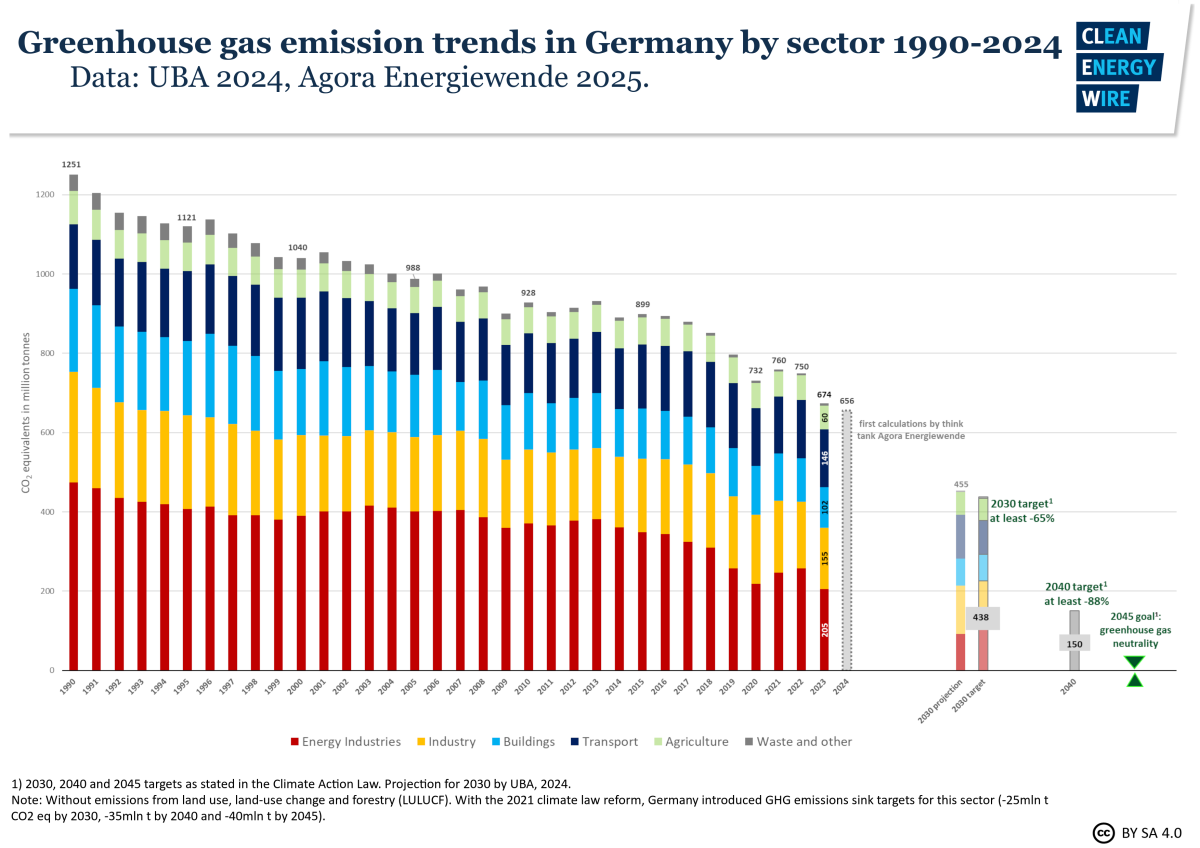Cleaner electricity mix helps to cut German emissions by 3% in 2024 – think tank
Greenhouse gas emissions decreased by three percent in Germany in 2024, as the country burned less coal while renewable electricity use increased, show calculations by think tank Agora Energiewende. Other reasons for the decline in emissions were mild weather conditions in winter and a weaker economy.
Compared to 2023, emissions fell by 18 million tonnes of CO2 equivalents (t CO2 eq) to a total of 656 million t CO2 eq, with the electricity sector being the main driver. The country has therefore stayed within the annual limit prescribed by its national Climate Action Law. Compared to 1990, Germany’s emissions have fallen by almost half, with the country aiming to hit a 65 percent reduction by 2030 and greenhouse gas neutrality by 2045. The German Environment Agency (UBA) will present official emissions data for last year by mid-March.
“Climate protection measures taken in recent years are increasingly having an effect on the electricity sector,” said Simon Müller, director of Agora Energiewende Germany. “With a significant increase in renewable energy and the positive trend in grid expansion, Germany is paving the way for a successful transformation in all sectors.”
Transport and building sectors lag behind
Emissions from industry increased slightly despite the weak economy. “Overall, the effect of the slight increase in fossil fuel consumption in the energy-intensive industry outweighed the general decline in production across all industries,” said the think tank in a press release.
“Rising industrial emissions in a stagnating economy show how urgently we need structural climate protection measures,” said Müller. In industry in particular, there is “enormous potential” for switching from fossil fuels to electricity-based processes.
Emissions reductions in the transport and building sectors also were too small and not due to climate action efforts, said the think tank. Heating emissions fell mainly because of milder winter temperatures. And while passenger car traffic actually increased in 2024, emissions reductions in the secotr occurred merely due to less freight truck traffic caused by a weaker economy.
Since a reform of the climate law in 2024, Germany no longer has strict emissions limits for each economic sector. Sectoral limits still exist, but failure to reach them no longer requires immediate action by the government. Instead, the country must stay within annual limits bundled across all sectors.
However, in addition to national targets, Germany must also reach EU targets as its contribution to the union's aim for climate neutrality by 2050. While energy and heavy industry are governed by a cap in the emissions trading system (EU ETS), emissions in transport, buildings and agriculture have joint annual limits under the effort-sharing system. Germany must halve aggregated emissions from these sectors by 2030 compared to 2005 levels.
Insufficient emission reductions in the transport and building sectors mean Germany could fail to reach its climate targets under EU rules this decade. To avoid penalty payments, the country will likely have to buy emissions allocations from other EU member states, said Agora.
The think tank called on the next government after the snap elections in February to strenghten it efforts especially in the transport and building sectors. Sales of heat pumps and new registrations of electric cars fell by 44 and 26 percent respectively in 2024 compared with the previous year. "In the next legislative cycle, it is important to transfer the momentum for change seen in the electricity sector to the demand sectors,” said Müller during a press briefing.
Viviane Raddatz, head of climate policy at NGO WWF Germany, said she regards the emissions data as “a clear mandate for the next German government.” It had to finally provide the necessary framework conditions for emission reductions in laggard sectors. Last year’s controversial heating law was “a step in the right direction,” she added. Also known as the Building Energy Law, the legislation covers the transition away from using fossil fuels for heating. An initial draft was widely criticised for imposing strict targets and deadlines for switching to climate-friendly alternatives such as heat pumps. The outgoing government initially failed to make it clear that there would be significant state support.
The conservative CDU/CSU alliance, currently leading the polls, says in its election manifesto it intends to abolish the heating law, although it is unclear what it would introduce in its place.
WWF’s Raddatz criticised the plans: “Wanting to reverse this completely would have fatal consequences for climate protection in Germany and the quality of life for many people.”


